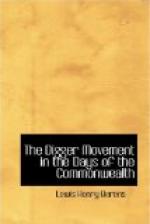“A Soldier is a Magistrate as well as any other Officer; and indeed all State Officers are Soldiers, for they represent power; and if there were not power in the hands of Officers, the spirit of rudeness would not be obedient to any Law or Government, but their own wills. Therefore every year shall be chosen a Soldier, like unto a Marshall of a City, and, being the Chief, he shall have divers soldiers under him at his command to assist in case of need. The work of a Soldier in times of peace is to fetch in Offenders, and to bring them before either Officer or Court, and to be a protector to the Officers against all disturbances.”
THE WORK OF A TASK-MASTER.
“The Work or Office
of a Task-master is to take those into his
oversight as are sentenced
by the Judge to loose their Freedom, to
appoint them their work,
and to see they do it.”
THE WORK OF A JUDGE.
“THE LAW ITSELF IS THE JUDGE OF ALL MEN’S ACTIONS; yet he who is chosen to pronounce the Law is called Judge, because he is the mouth of the Law: for no single man ought to judge or to interpret the Law. Because the Law itself, as it is left us in the letter, is the mind and determination of the Parliament and of the people of the Land, to be their Rule to walk by and to be the touch-stone of all actions. And the man who takes upon him to interpret the Law, doth either darken the sense of the Law, and so make it confused and hard to be understood, or else puts another meaning upon it, and so lifts up himself above the Parliament, above the Law, and above all people in the Land.
“Therefore the work of that man who is called Judge is to hear any matter that is brought before him; and in all cases of difference between man and man, he shall see the parties on both sides before him, and shall hear each man speak for himself, without a fee’d Lawyer; likewise he is to examine any witness who is to prove a matter on trial before him. And then he is to pronounce the bare letter of the Law concerning such a thing: for he hath his name Judge, not because his will or mind is to judge the actions of offenders before him, but because he is the mouth to pronounce the Law, who, indeed, is the true Judge: Therefore to this Law and to this Testimony let everyone have regard who intends to live in Peace in the Commonwealth.”
Then occurs a passage that shows how carefully Winstanley had watched the public affairs of his own times, more especially the prolonged attempt of the late King to govern England under cover of ancient obsolete Laws interpreted by Judges removable at his will. He continues:




